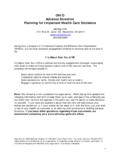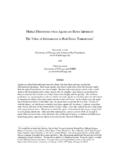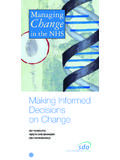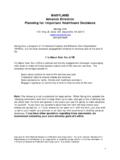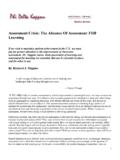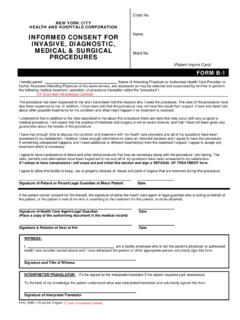Transcription of Enhancing evidence-informed policy making - Peter Gluckman
1 OFFICE OF THE PRIME MINISTER S CHIEF SCIENCE ADVISOR Professor Sir Peter Gluckman , KNZM FRSNZ FMedSci FRS Chief Science Advisor Enhancing evidence-informed policy making A report by the Prime Minister s Chief Science Advisor July 2017 Office of the Prime Minister s Chief Science Advisor PO Box 108-117, Symonds Street, Auckland 1150, New Zealand Telephone: +64 9 923 6318 Website: Email: Enhancing evidence-informed policy making 2 OFFICE OF THE PRIME MINISTER S CHIEF SCIENCE ADVISOR Professor Sir Peter Gluckman , KNZM FRSNZ FMedSci FRS Chief Science Advisor July 5th 2017 The Prime Minister Rt Hon Bill English Wellington Dear Prime Minister Re: Evidence in the formulation and evaluation of policy Since my last report1 on this topic published in 2013, there has been an encouraging number of developments occurring at the interface of science (broadly defined as including both the natural and social sciences) and public policy in New Zealand.
2 Most notably, these developments include: the appointment of ten departmental science advisors; the establishment of a Committee of Science Advisors (CoSA); the exploration of how to better use data and science to inform public policy development especially in the social sector; and a greater engagement of the science advisory system in disaster risk reduction and risk management. Internationally there is a growing appreciation of the importance of an effective science advisory ecosystem and considerable interest in the emergent New Zealand model. This is in part prompted by the formation of the International Network of Governmental Science Advice (INGSA) following an international meeting on the issue supported by the New Zealand Government in At the same time globally there has been increasing concern about risks to the effective interface between science and public policy .
3 For instance, recently we have seen the rise of post-trust and post-expert rhetoric elsewhere influencing public policy decisions, a situation which New Zealand has fortunately to date largely been spared, but we cannot be complacent. There remain potential issues at the interface between science and policy , and between science and society that largely relate to matters of effective engagement, transparency and accessibility of expertise. These issues merit ongoing consideration. The interface between scientific evidence and public policy is complex. Much of this complexity is a result of the inherently different epistemic underpinnings and processes of these two domains.
4 In general policy makers must deal with choosing between options based on considerations that extend well beyond simply the scientific evidence. What s more, the science pertaining to the very issues for which decision-makers need it most is generally incomplete and sometime ambiguous. This challenge should not undermine the important role of scientifically derived evidence in informing policy options but it does have important implications for how the interface between science and public policy should best be structured. 1 Gluckman , P. 2013. The Role of Evidence in policy Formation and Implementation. Office of the Prime Minister s Chief Science Advisor ( ) 2 Enhancing evidence-informed policy making 3 Following discussions with both the former Prime Minister, the Rt Hon John Key, and more latterly with yourself, it was agreed that it would be appropriate for me to again review the state of New Zealand s science advisory ecosystem and to identify where progressive improvements still could be made.
5 As part of the preparation for this report, over the past year my Office has conducted extensive interviews with both providers of scientific advice and, importantly, with Ministers and officials who are the recipients of that advice. That feedback together with a growing body of knowledge from the international community of science advice practitioners and theorists, including via INGSA, informs this third report. As with my previous reports, a central message is that evidence alone rarely is the basis of policy formation. It must always be acknowledged that there are many other considerations and factors at play within policy decision making .
6 But it is important that any public policy decision is informed by what we know and do not know from robust evidential approaches. Regardless, the underlying premise must be that better decisions are more likely to be made when they are informed by evidence. The worrisome rise of post-truth polemic and the greater and easier promulgation of false news that we have seen globally in recent times can be seen as threats to the democratic process, social cohesion and good governance. I believe that a commitment to protect and enhance the evidential input into the policy process is an increasingly important defence against these trends.
7 It is in this spirit that I commend this report for your consideration. Yours sincerely, Professor Sir Peter Gluckman , ONZ KNZM FRSNZ FMedSci FRS Chief Science Advisor to the Prime Minister of New Zealand Enhancing evidence-informed policy making 4 Acknowledgements I thank Dr Louise Pinfold for her work researching this report and preparing early drafts of material from which it draws. Dr Pinfold undertook extensive semi-structured interviews with the Departmental Science Advisors and senior officials in ministries, central government agencies (Treasury and DPMC), and key government knowledge producers such as Statistics NZ, Superu and Crown Research Institutes.
8 She also consulted the wider science community, including Universities, the NZ Association of Scientists, Royal Society of New Zealand, Universities NZ, Health Research Council, private research institutes (MOTU, NZIER) and a portion of the business community via ATEED and a regional council HBRC. All interviewees were generous with their time and contributions, without which this report would not what been possible. I also thank the Departmental Science Advisors, Dr Stephen Goldson and Ms Kristiann Allen in my office, for critical review and input throughout the preparation of this report. Enhancing evidence-informed policy making 5 Contents LETTER TO THE PRIME MINISTER 2 ACKNOWLEDGEMENTS 4 1.
9 THE CONTEXT OF SCIENCE IN SOCIETY 6 2. THE CONTEXT OF SCIENCE ADVICE 6 DEPARTMENTAL SCIENCE ADVISORS (DSAS) 8 THE ROLES OF DSAS 9 THE COMMITTEE OF SCIENCE ADVISORS (COSA) 10 3. DATA AND policy making 10 DATA AND SCIENCE informed SOCIAL INVESTMENT ( CITIZEN-BASED ANALYTICS ) 11 EXTENDING THE SYSTEMATIC USE OF DATA TO INFORM policy 14 FROM DATA TO EVIDENCE: WHAT WORKS IN DIFFERENT CONTEXTS? 15 4. THE ACADEMIC- policy INTERFACE 15 THE policy COMMUNITY PERSPECTIVE 16 THE ACADEMIC COMMUNITY PERSPECTIVE 17 5. RISK MANAGEMENT, CRISES AND EMERGENCIES 19 6. HORIZON SCANNING AND FUTURES EXERCISES 20 7. OTHER COMPONENTS OF THE ECOSYSTEM 21 8.
10 THE OFFICE OF THE PMCSA 21 Enhancing evidence-informed policy making 6 1. The context of science in society In recent years there has been considerable and growing reflection on the interface between scientific evidence (derived from both from the broadly defined social and natural sciences) and public policy formation. In turn this interface cannot be seen in isolation from the interaction between science and the rest of society itself. This relationship is changing because the nature of science and its contribution to society is itself changing, but also because the digital age has enhanced enormously the accessibility of knowledge.




